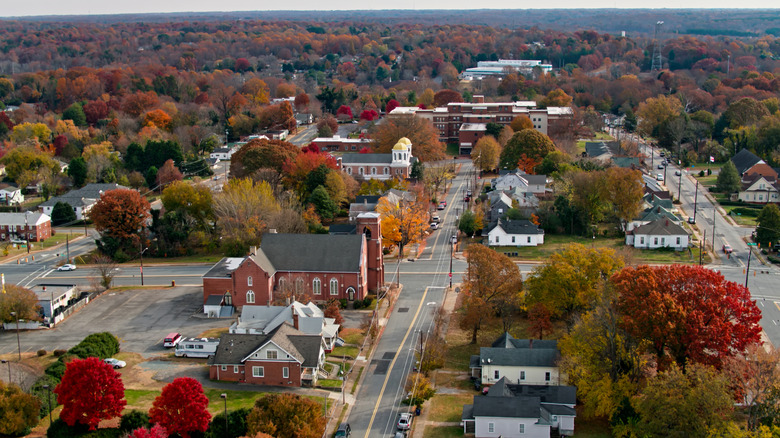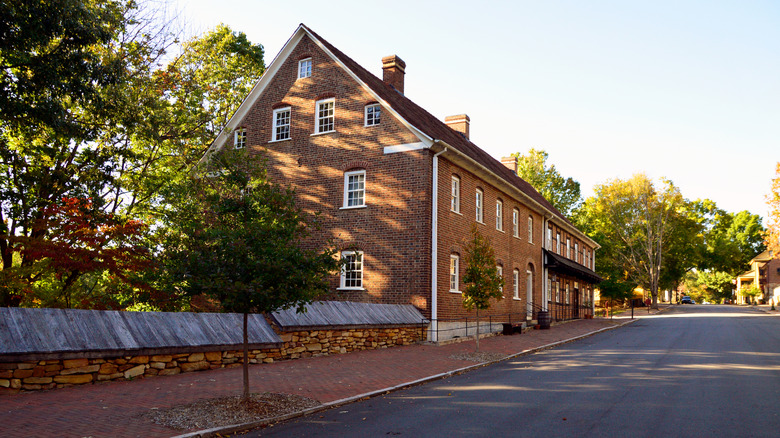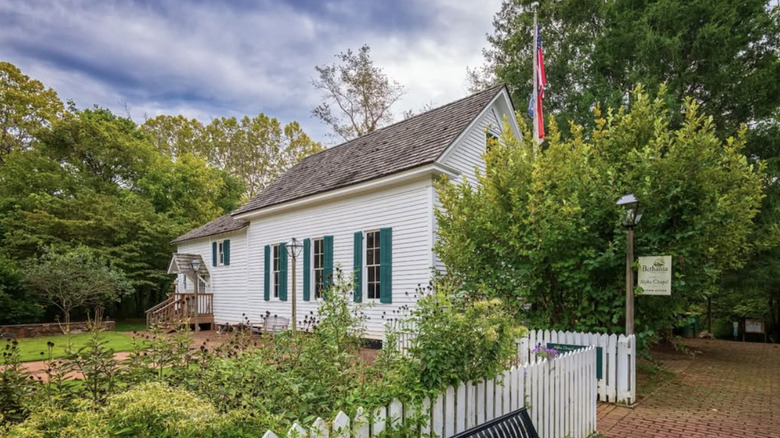Situated Near Winston-Salem Is North Carolina's Historic Town With European Village Vibes
North Carolina has a little bit of everything. City-lovers can enjoy the fast-growing urban swell of Charlotte, beach bums can swarm to Wilmington's sandy shores, and the outdoorsy among us can revel in Asheville's art and brewing scene after a good hike (or head to this artsy mountain town with Asheville vibes but none of the crowds instead). What you might not anticipate are the state's unique Central European ties and the 250-year-old history its lesser-known towns hide. Bethania, on the outskirts of Winston-Salem, is one of those places, echoing a European village with its architecture and town planning.
Bethania (and Winston-Salem) traces its roots to early protestant settlers from what is now the eastern Czech Republic. The Moravians, as they were called, planned six settlements in what is now Forsyth County, North Carolina, with only Bethania and Winston-Salem remaining. While the latter has grown in size to become one of the state's larger cities, Bethania has remained small with a population of just 362.
Small doesn't mean it's any less important. Despite its size, in 2001, the settlement earned the title of National Historic Landmark. As one of the United States' few remaining examples of Germanic linear villages — a type of agricultural-centered town planning dating back to the Middle Ages — it makes for a unique detour on any North Carolina itinerary.
What to do in North Carolina's European-style Bethania
There's no getting around it: Bethania is tiny. At just 500 acres, its Historic District is easily walkable in a short visit. But that size and old-world feel are part of the charm. The town has multiple excellent walking paths and hiking trails that lead through the Historic District and the surrounding countryside. The popular Orchard Trail is the best option for seeing most of the historic homes in the town, while the Graveyard Trail leads to a colonial-era road that links the now-ruined Moravian settlement of Bethabra with Bethania. For a quieter, nature-focused wander, try the Black Bottom Walnut Trail. Swing by the visitor center before leaving to grab a map and some info on the things you'll see along the way.
Within the town itself, you'll find plenty of examples of Moravian architecture. Most of the buildings are still inhabited, but the Wolff-Moser House, built around 1800 and restored in the early 2000s, is open for tours. The house and adjacent visitor center are open from Tuesday to Friday, 10 a.m. to 4 p.m. — something to consider if you're planning a weekend trip. Alpha Chapel, currently used as the town's meeting hall, is another notable building that was constructed in 1895.
Of course, nearby Winston-Salem, of which Bethania is a suburb, boasts its own Moravian history, too. An immediate highlight is Winkler Bakery, the oldest continually operating bakery in America, which was opened in 1799 and still uses the original wood-fired oven from centuries ago.
How to plan a trip to Bethania
Bethania is surrounded by Winston-Salem, so in many ways, it's easiest to use the city as a basis for any travel. While the city does have its own airport, it's primarily used for corporate charter flights, so it won't be much use for leisure travelers. Raleigh-Durham International and Charlotte Douglas International are roughly between 90 minutes and two hours away by car, offering regular access from virtually every corner of the country.
While there are bus links in Winston-Salem, it's easier to book an Uber, rent a car, or call a taxi. It's about a 20-minute drive to Bethania from downtown, as opposed to a multi-transfer bus route that could take well over an hour. A walk from Winston-Salem's Old Town — the Moravian part — to Bethania is only 30 minutes.
You won't find any accommodations or restaurants in Bethania itself, but Winston-Salem is full of strong options. Its restaurant scene, in particular, is becoming something of a force in North Carolina. Its hotel selection is surprisingly eclectic, offering a range of modern options and unique historic properties that lean into the downtown area's Art Deco style. Wherever you choose to stay or eat, Bethania will offer a unique look into the little-known history of the Moravians in North Carolina.
Interested in checking out another notable small town nearby? Head 30 minutes north to visit North Carolina's best small towns, Mount Airy, to check out some Hollywood history.


